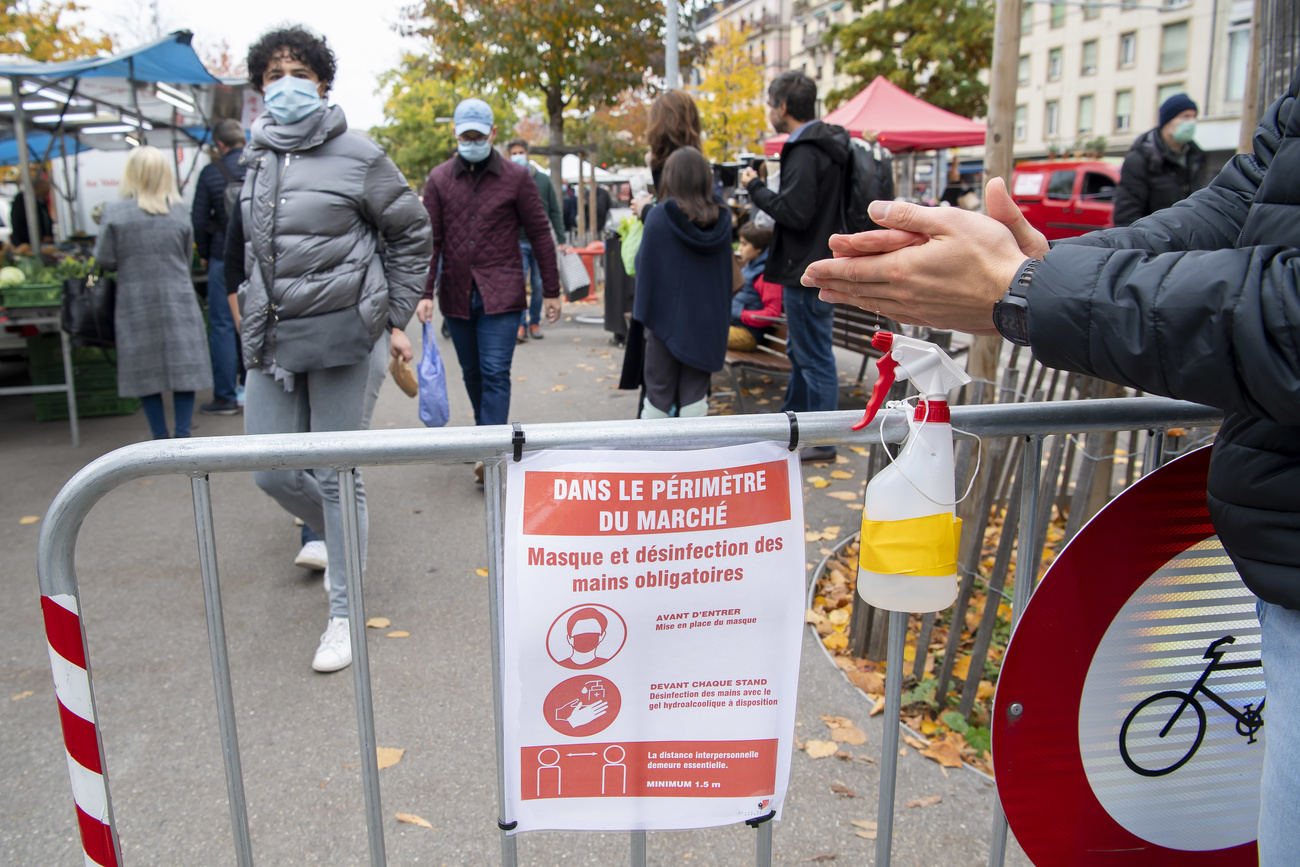
Is France paying the price for ‘lax’ Swiss Covid measures?

Strict confinement in France versus more liberal measures in Switzerland: does this promote a cross-border spread of the virus? This is a controversial issue at a time when Switzerland has far from the best Covid-19 situation in Europe.
In June, Switzerland seemed to have withstood the first wave of the pandemic thanks to a rather satisfactory political and economic response. At the time, Hong Kong-based think tank Deep Knowledge GroupExternal link even placed it at the top of its global safety assessment ranking. In August, however, the Alpine nation was downgraded to fourth place, behind Germany, New Zealand and South Korea.
How about today? “We are in the process of transforming our analyses into dashboards,” says Luke Zanev, project manager of the Deep Knowledge Group. That’s why the organisation has not updated its Covid-19 ranking, based on more than 140 parameters. Zanev adds that this list is based on medium- and long-term projections and not on day-to-day statistics.
Unperturbed by current infection rates, Zanev says he is “certain that the Swiss authorities will take first-class measures and that the country will remain in the top 20”. Figures from the World Health Organization (WHO) depict a harsher reality. Geneva tops its list External linkof the regions most affected by the virus in Europe. Three other French-speaking cantons – Fribourg, Vaud and Neuchâtel – are among the top 20 worst cases. As a result, neighbouring countries are looking with somewhat accusing eyes at Switzerland, where the galloping infection numbers have not triggered a lockdown.
Hotspot border regions
Last Thursday, French Prime Minister Jean Castex ruled out any easing of the national lockdown, which will last until at least December 1. However, contamination rates are lower in France than in Switzerland. The incidence rate External linkover the last two weeks (number of new cases per 100,000 inhabitants as of November 17) was 872 cases per 100,000 inhabitants in France, while it reached 1,023 in Switzerland. The test positivity rate is 19.5% in France, compared to 26% in Switzerland.
The Haute-Savoie region that borders Switzerland has the top incidence rateExternal link in France (more than 700 positive cases per 100,000 inhabitants over 7 days). Is this a coincidence?
“The traffic between Geneva and neighbouring France is undoubtedly having a direct effect on the worsening epidemic in Haute-Savoie,” Pierre-Jean Ternamian, president of the Regional Union of Health Professionals of Auvergne-Rhône-Alpes, told Le Temps newspaper. “Cross-border commuters are among the factors that have favoured the spread of the virus,” adds the doctor, who deplores the “half-measures” and the “delay” by Switzerland in the fight against the pandemic.
Cross-border cooperation
“This is not the time to blame each other,” says Geneva state councillor Mauro Poggia. Maintaining the border crossings is in the interests of both countries. Poggia, who holds the health portfolio, has not forgotten how closure of the borders during the first wave, albeit with exceptions for border residents, strained the economy on both sides.
In Geneva, the incidence rate in the last 7 days is about 1,300 per 100,000 inhabitants, although in the last week the number of new infections has been declining. “Geneva is imposing the strictest measures in Switzerland,” says Poggia, closing down bars and restaurants as well as non-essential shops. In that sense it’s not so different from the policy in France.
Poggia claims that it would be difficult to be any stricter at a time when the neighbouring Swiss cantons have no confinement measures and when some people of Geneva go to shop in canton Vaud. “Cross-border cooperation is good,” adds Poggia, who is in fortnightly contact with the region’s French prefects. It is worth noting that around 100,000 cross-border commuters work in Geneva and that half of the 12,000 employees of the Geneva University Hospital (HUG) are French nationals.
Too slow to react?
“Haute-Savoie has the dynamics of an economic metropolis,” says French parliamentarian Marion Lenne of President Emmanuel Macron’s La République en Marche party. The region may be surrounded by high mountains but it is strongly integrated into the economic and demographic fabric of a prosperous region. The French authorities have no doubt “ignored this obvious fact” by not applying the night-time curfew to Haute-Savoie imposed elsewhere in France in October, says Lenne. The politician also regrets that France’s parliamentarians do not participate in cross-border coordination due to French centralisation of decision-making.
“We need to broaden this, to create à la carte arrangements in times of crisis,” she says. Above all, Lenne does not want closing of the borders.

In compliance with the JTI standards
More: SWI swissinfo.ch certified by the Journalism Trust Initiative


























Join the conversation!